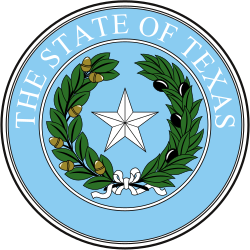| |||||||||||||||||
| Turnout | 53.01% (of registered voters) 42.07% (of voting age population) [1] | ||||||||||||||||
|---|---|---|---|---|---|---|---|---|---|---|---|---|---|---|---|---|---|
| |||||||||||||||||
Abbott: 40–50% 50–60% 60–70% 70–80% 80–90% >90% Valdez: 40–50% 50–60% 60–70% 70–80% 80–90% >90% Tie: 40–50% 50% No data | |||||||||||||||||
| |||||||||||||||||
| Elections in Texas |
|---|
 |
The 2018 Texas gubernatorial election took place on November 6, 2018, to elect the governor of Texas, concurrently with the election of Texas's Class I U.S. Senate seat, as well as other congressional, state, and local elections throughout the United States and Texas. Incumbent Republican governor Greg Abbott won re-election to a second term in office [2] defeating Democratic nominee Lupe Valdez, the former sheriff of Dallas County, and Libertarian nominee Mark Tippetts, a former member of the Lago Vista city council.
Contents
- Republican primary
- Candidates
- Endorsements
- Polling
- Results
- Democratic primary
- Candidates 2
- Endorsements 2
- First round
- Runoff
- Libertarian nomination
- Candidates 3
- General election
- Debates
- Endorsements 3
- Predictions
- Polling 3
- Results 4
- Analysis
- Voter demographics
- References
- External links
The Republican and Democratic party primaries were held on March 6, 2018, making them the first primaries of the 2018 electoral season. [3] Abbott won the March 6 primary with 90% of the vote to receive the Republican nomination, while Democratic candidates Lupe Valdez and Andrew White advanced to a May 22 runoff. [4] Valdez defeated White in the runoff with 53.1% of the vote and faced Abbott in the general election as the Democratic nominee. [5]
Valdez's nomination made her the first openly gay person nominated for governor by a major party in the state. [6]
Tippetts was nominated at the Libertarian Party of Texas' state convention in Houston April 13–15, 2018. He defeated three challengers, as well as the None Of The Above option, on the first ballot and received more than 70% approval from Libertarian party delegates.
Despite considerably closer contests in other Texas state elections, Abbott handily won a second term with the highest margin of victory of any state executive official on the ballot, although Valdez also won the largest vote share for a Democratic gubernatorial candidate since Ann Richards in 1994. [7] Tippetts' showing exceeded the previous record for most votes for a Libertarian nominee for Texas governor; that record had been set in 1990.
The election also took place alongside a closer, higher-profile Senate race between Beto O'Rourke and Ted Cruz, which may have played a factor in making the Democratic gubernatorial candidate considerably more competitive than in 2014. Abbott won a majority among white voters (72% to 26%), while Valdez won majorities among African Americans (80% to 16%) and Latinos (63% to 35%). [8]






